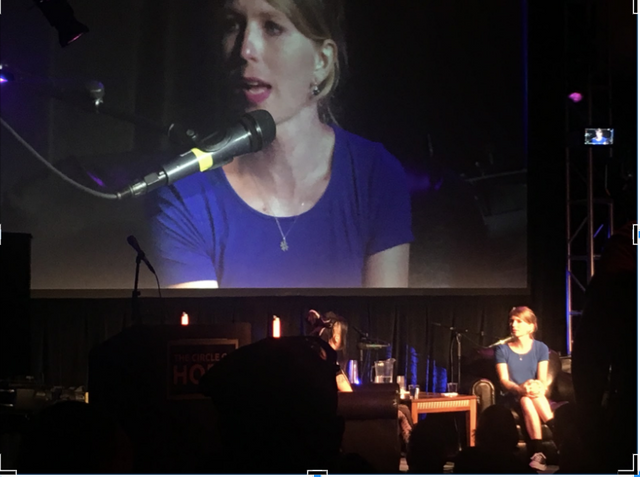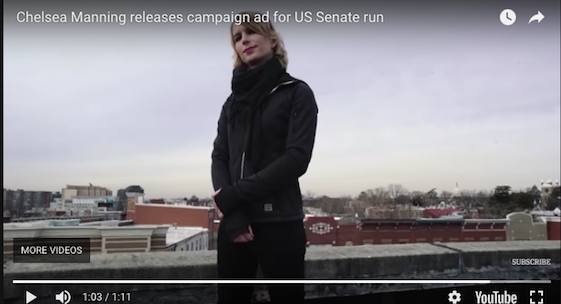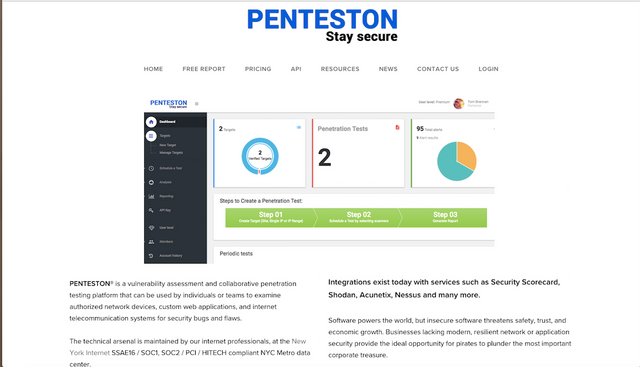Chelsea Manning Talks about Her Life at HOPE Conference

Manning at HOPE.
Former U.S. Army intelligence analyst and transgender rights activist Chelsea Manning spoke with Yan Zhu, security and privacy engineer, software engineer and technology fellow at the Electronic Frontier Foundation, about her life at the Hackers on Planet Earth or HOPE Conference’s 12th event at the Hotel Pennsylvania in New York City on July 21, 2018.
In May 2017, Manning was released from a Kansas prison after being convicted in 2013 of 20 counts of espionage, theft and disobeying regulations for releasing the largest amount of classified information in U.S. military history to WikiLeaks in 2010. She served about 7 years of her 35-year prison term after President Obama commuted her prison sentence in January 2017.
Manning spoke to HOPE attendees about running against incumbent Sen. Ben Cardin in the Democratic primary for U.S. Senate in Maryland in 2018 (she lost), prison, social media, life as a woman, ethical software development and the software and hardware projects she is working on.
Following are some of Manning’s comments during the almost two-hour discussion, which included questions from audience members.
Running for the U.S. Senate
When you run for political office, you’re given a platform and I wanted to be able to say that things that I believe. Not the things that I think will get me elected, but the things that I believe and bring them to the table…Things like abolish ICE. Things like defund police departments.
You know, I believe in these things. I think they should be on the table and that was why I ran. …And I made a very calculated decision…I basically had a small campaign staff. And we had a meeting together, and before we announced…and shortly after we announced…I was like, what do we do…should we change our principles in order to try and win and then use like an actual Senate office to do these things. Or do we want to not change our principles, say the things we want to say, do the things that we want to do and start from there.
And I think we all came to a consensus that we were going to move forward with saying the things that we actually believe.
Meeting Voters
…It was actually funny because I went out canvassing, and I didn’t do it like as a photo op moment or anything like that. I didn’t post any photos of it on Twitter. I didn’t talk about it publicly, but I did actually go out canvassing. And so all across the state of Maryland, particularly in Baltimore, and I just knocked on people’s doors and registered voters and just said, ‘hey, you know, what are the issues you care about?’ It was tough because I got grilled by some real genuine people who have real issues, real problems and I didn’t always have the answer. And you know, and I’m really more of an activist. I’m not a politician. I kinda suck at being a politician, honestly. I’m way better at being a sysadmin than I am at being a politician.
…So like standing on the doorstep of somebody who has real problems and real issues and is struggling and being grilled by them. And really intelligently. It wasn’t journalists who asked me the most profound questions. It was standing on somebody’s doorstep where people feel really confident and having them ask you a tough question and being put on the spot like that. That was one of the toughest things I’ve ever done. And I had to openly admit sometimes like I don’t have an answer. It’s really complicated. I have never thought about that before. I want to get back to you. Like I’d like to email you back or send a letter back, you know, and maybe come up with an answer, but I don’t know. And that was tough to say.
Voters’ Stories
…People have these stories. They have these powerful emotional stories about, you know, about the struggles they’re going through. I remember I talked on the porch with a woman. She was an elderly lady, a woman of color in Baltimore. I stood on her porch. She wouldn’t open the door, so we talked through the screen door and I was okay with that.
She’s like, ‘Oh yeah, I’ve been voting for 40 years and I’m sick and tired of it. I’ve been voting and voting and voting and things just get progressively worse. They get progressively worse in my community. They get worse and worse and worse and all these politicians come and they knock on my door and they say the same things; they make the same promises. They say they’re going to give the world to us and then they never do.’ And I didn’t want to be the person who did the same thing. But I didn’t make her any promises. And I didn’t tell her any B.S.
That was tough to hear that story. And she had a daughter got cancer and even healthcare was too expensive. And I just think that’s an anecdote. But like doing this, like I did this a couple of hundred. I did this several hundred times and so everybody had like something powerful like this.

Manning’s U.S. Senate campaign ad video.
What Manning Learned about Politics
I think that we have political system that is inherently unfair; that is inherently biased and it was really tough and intense to like you’ve worked in a different environment that closes, it closes resources off to people and it makes it inaccessible and you can’t get these ideas out there because like the price of running a campaign is immense.
The price of hiring staff is immense and like getting even in the door is so difficult. I just don’t have a whole lot of confidence in the American political system and I think that there are other political systems that obviously have a better balance that I think we should think about and we should try. I think that campaign finances and the expectation of having advertising, you know, enormous amounts of advertising for budgets. I mean, which I didn’t, I didn’t advertise, we didn’t buy any television advertising slots, so, and we didn’t have those, like, I didn’t feel comfortable from an environmental standpoint to have yard signs. I thought like, I don’t want to leave a zillion yard signs and like poles in the ground…
You Will Need to Surrender Your Principles if You Want to Run for Office
If you go down the traditional route it will change you. You’ll have to change your principles. You have to let go of some of the things that you care about in order to fit in and in order for you to be accepted in this environment. And that’s unfair and it’s improper. But that’s what they expect, you know. And I think it’s funny whenever the Maryland DNC says like, ‘Oh yeah, we’re not going to interfere,’ you know, but then they interfere covertly behind the scenes. You know, it’s like this is like if you have actual principles you will find it incredibly hard. So you either have to let go of those, or I mean good luck.
The Democratic Socialists of America
…I’m encouraged by what I see from some parts of DSA, but I think that it’s like the DSA has been going through like a rejuvenation phase. And so there’s a lot of growing pains with that. And I’d like to see where the DSA in particular lands on some of these things because I don’t think that’s been worked out yet. So yeah, I’m definitely paying attention to things that are going on, you know, people who are, whether or not there officially DSA or whether or not they’re aligned with DSA or associated with, I’m very encouraged.
Life after Prison
I mean, I was 22 when I got locked up. I spent eight years of my life in prison…It sounds cliché, but prison is all I know. I mean, that’s really true. That’s actually true.
So I’m making a lot of, like, there’s a lot of new things that I’m learning…I had never rented my own place before…Now I pay rent and I pay bills. I went from being homeless to living with my aunt, to like being in the military. I never had my own place to live in before. And so this is the first time I’m living out on my own. And….actually I want to say I want to, I want to talk a little bit about like my adjustment because it’s been really hard and I’m really only starting to grasp how hard it’s been.
….I’ve been kind of like, I’m really struggling sometimes because I spent a year in solitary confinement and so I have some anxieties and fears associated with that that I, that I don’t like to talk about….There’s like, just like social stuff that I’m used to like, you know, um, you know. Like prison dynamics, like prison, social dynamics and how assertive and aggressive you have to be in order to interact with people is I think, you know, I can be a little forward sometimes and a little blunt sometimes…
Like sometimes and I’ve actually done this, I did this a few months ago. I got up in the middle of the night and I felt lonely. And I was in my own apartment in my bedroom and I felt the temptation to beat on the wall and just say, ‘hey, how’s it going?’ Like that was normal for me at one point in my life and it’s not anymore.
Living on my own, like is the first time that I’ve ever been around people for years on end. I mean, except for that period in solitary confinement in 2010 and early 2011. I was around lots of people and I got used to that and I enjoyed the communal environment…
Social Media
We’re now being hyper stimulated. This machine learning is like finding that little spot on the reptilian part of our brain to like encourage us to generate more content, which then generates more content.
And so these algorithms are creating a feedback loop. And so that feedback loop is like, hey, you know what really gets people going on Twitter? When they’re angry and they’re upset about something and something crazy and unexpected is happening. So like now the algorithms are encouraging that. And that’s why we see so much weird stuff happening. That’s because these algorithms are honing in on this little meme-regenerating weakness in our brain where now the memes spread. It is just like DNA. With this information, I get the sense this is actually trying to, in a sense, without cause or direction, we are the vehicles of reproduction for information. And Twitter and Facebook and these social media algorithms are exploiting that.

Chelsea Manning
Gender Discrimination
I had a privilege drop. I went from having white male privilege to have a white trans woman privilege, which is a totally different game. It’s a totally different environment. And that’s really hard to deal with because I’m not used to it all the time and I shouldn’t have to deal with that obviously, but it is a real phenomenon. And it’s something that I have experienced. The biggest offender is, like whenever I go to Micro Center and I’m like walking down the store and people like white, middle class males come up to me like, hey, you know, like they’re telling me stuff about technology. And I’m like I know what I’m doing. That’s not what I’m looking for. Actually, what you’re saying is not what I’m looking for at all.
— — — — — — — — — — — — — — — — — — — — — — — — — — — — — — —
First Cybersecurity Platform Created at NYU Tandon School of Engineering Future Labs Launches

Credit: Penteston
Tom Brennan, president of the Critical Infrastructure Association of America, and founder of Proactive Risk, launched Penteston, the first Software-as-a-Service (SaaS) platform created at the NYU Tandon School of Engineering’s Future Labs that assesses cybersecurity risk.
The NYU Tandon School of Engineering’s Future Labs initiative is the first public-private partnership with New York City tasked with creating a sustainable incubation program focused on increasing the success rate of new ventures and generating positive economic impact.
BugHeist software bug reporting and remediation website announced its partnership with Brennan to provide software crowd testing services through an API to Penteston on June 28, 2018.
With BugHeist’s API, Penteston users can post software issues with websites, browsers, device operating systems and user profiles on BugHeist. This allows users to share bugs that individuals can find and fix in real-time.
— — — — — — — — — — — — — — — — — — — — — — — — — — — — — — —
OWASP New York City and we45 Offer Application Security Software Automation Workshop
Evin Hernandez, president of OWASP New York City, announced the organization is presenting an AppSec Automation Masterclass with we45, the secure software development and testing company, on August 16 and 17, 2018.
According to OWASP NYC’s Meet-Up page, the event is “a two-day hardcore hands-on program that details practical approaches which can be used by QA, DevOps and security practitioners to develop AppSec testing/assurance pipelines.”
Click here for more details.